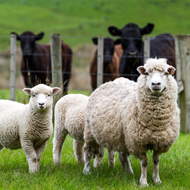Three cases of rare cattle fever confirmed

Cattle can become infected when they are kept in close contact with sheep or lambs.
Three farms in the south-west have reported isolated cases of a rare cattle fever, malignant catarrhal fever (MCF). Farmers are being urged to watch their cattle closely if they are being co-grazed with sheep.
The affected cows were from two farms in west Dorset and one in east Devon, according to Farmers Weekly. The animals, which have now been euthanised, had shown a lack of appetite, painful red eyes and a very high temperatures. All three cows had followed sheep on their grazing rotation.
MCF is a sporadic disease, usually affecting only single animals in a herd. In the UK, it is caused by ovine herpesvirus-2, which affects sheep without causing clinical disease. Cattle can become infected when they are kept in close contact with sheep or lambs.
BVA's senior vice president, John Blackwell, told Farmers Weekly that three cases in one locality "would be unusual".
The recent flare ups were diagnosed by Synergy Animal Health. According to Synergy vet Alistair Moffet, those most at risk from MCF would be mixed farms or dairy farms that rent winter grazing to sheep.
Mr Blackwell said the cases reinforce the importance of being vigilant and watching cattle closely.



 The Animal and Plant Health Agency (APHA) has updated its online reporting service for dead wild birds.
The Animal and Plant Health Agency (APHA) has updated its online reporting service for dead wild birds.